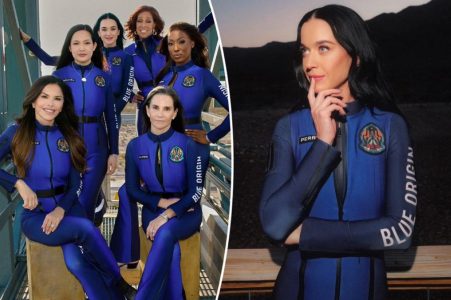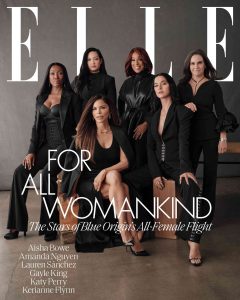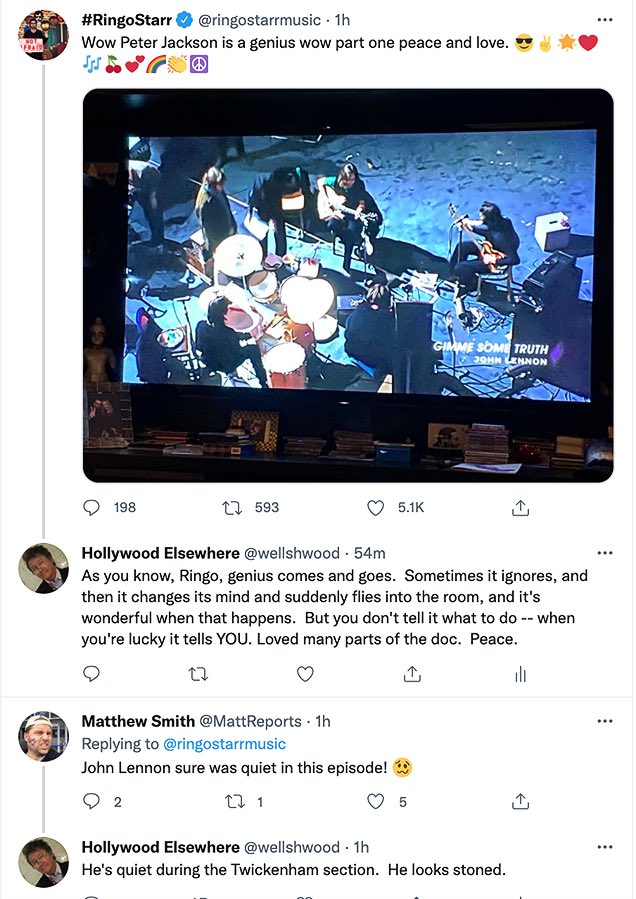“Wake the fuck up.” — gpatj8
@gpatj8 I woke up in a good mood this morning. #narutoshippuden #greenscreen #hermesthecynic ♬ original sound – gpatj
“Wake the fuck up.” — gpatj8
@gpatj8 I woke up in a good mood this morning. #narutoshippuden #greenscreen #hermesthecynic ♬ original sound – gpatj
The all-female crew aboard Monday’s Blue Origin flight (10 or 11 minutes, launch to touchdown) include Lauren Sanchez, Katy Perry, Gayle King and film producer Kerianne Flynn. These guys don’t seem deep or expressive enough. An all-woman Blue Origin crew should ideally include an older world-class actress or two — Tilda Swinton, Meryl Streep, Cate Blanchett. Suggestions?


Not astronauts…no skills, no agency, no training…strictly passengers…a ride shorter than the average Disneyland jaunt.
For those who don’t like Rahm Emanuel, Gavin Newsom or Pete Buttigeig, I mean.
I haven’t been able to find an embeddable video clip of Deadline‘s Pete Hammond‘s blink-and-you’ll-miss-it press conference line in the season 4 opener of Hacks, which premiered Friday night. I just caught it this evening. I’ve known Pete since the mid ’80s, and hey, it’s not nothing…credit where due. Pete wanted to be an actor way back when.

Here’s one of the most insightful HE pieces I’ve written within the last five years….seriously…but because it included a certain kind of counsel for the beloved non-genius Ringo Starr, the commentariat shat all over me. This was posted two years ago:
2001 costar Keir Dullea, speaking in 2001 video essay (1:58): “Working with Stanley Kubrick blew my mind. You just were aware that you were in the presence of genius.”
I’ve always felt that genius is an overused and certainly an imprecise term, because it’s not any kind of fixed or constant condition within this or that individual.
What genius is, basically, is profound receptivity…an open door or window through which genius-level stuff flashes from time to time. Sometimes it blows hot and stormy, sometimes it’s just a whisper or a tap on the shoulder, and sometimes it’s both. It’s mainly just something that certain people channel or become a conduit of, and no more than that. It’s mostly a kind of fearless electric current… a crackling quality in the mind and spirit.
I felt it when I had lunch at The Grill with Leonardo DiCaprio in the summer of ’93. He was 18 and 1/2, and I knew right away that he had that snap-crackle-pop going on inside. But you know who doesn’t have it? Anyone who says that this or that person is flat-out imbued with eternal genius. I’m sorry but no.
In a riff called “Genius Visits When it Wants To,” I attempted to explain the same thing to Ringo Starr. His statement that Peter Jackson was a “genius” irritated me as much as Dullea did in the 2001 video.
Some HE commenters were appalled and irate that I had the temerity to offer this knowledge in a tweet. “Hold moley…How dare you discuss the limits of genius with a famous ex-Beatle!” they seemed to be saying. “You’re just a journalist…it’s not your place! You need to be obsequious!”
What I said: “As you know, Ringo, genius comes and goes. Sometimes it ignores, and then it changes its mind and suddenly flies into the room, and it’s wonderful when that happens. But you don’t tell it what to do — when you’re lucky it tells you.”
Anyone who uses the word “genius” should be regarded askance. It’s in the same league as “awesome”, “amazing”, “totally” and “absolutely.”

HE deeply mourns the death of actor Nicky Katt, who only made it to age 54 so some ill wind or unlucky incident took him down. No cause of death has been reported. I’m very sorry.
Rest assured that Katt’s acclaimed performance as “Stacy the low-rent hitman” in Steven Soderbergh;’s The Limey (’99) will live forever in the annals of cinema.
I know nothing but my wild guess is that Katt’s unfortunate failure to match, must less top, this one great performance over the last 26 years might have been a factor in his demise. I’m guessing that the poor guy died of a broken heart. He was 28 or 29 when The Limey was filmed.
All screen villains are perverse or flamboyant in one way or another, but it’s fairly rare to run into one with with a truly twisted or offbeat attitude. In an off-handed, no-big-deal, between-the-lines sort of way, I mean. Not a “comedic” figure, but a dour, compromised soul whose bizarre manner, obsessions and quirks makes him/her a bit laughable or at least amusing to some extent.
Stacy was one such figure. Fairly sullen and hostile and always ready to clip someone if the money is right, but there was something about his smart-ass manner that suggested a less-than-fully-malicious fellow. Something vaguely nihilistic in a laid-back way.
About halfway through The Limey Katt delivered an improvised bad-attitude riff while he and Joe Dallesandro watched a TV show being shot. “Why don’t they make shows about people’s daily lives?,” Katt/Stacy said. “That you’d be interested in watching, y’know? Sick Old Man or Skinny Little Weakling. Big Fat Guy…wouldn’t you watch a show called Big Fat Guy? I’d watch that fucking show.”
Katt was lucky that The Limey was shot in ’98 or ’99 because today you’re not allowed to say “big fat guy” in a movie as this would constitute fat-shaming, and anyone deemed guilty of writing or saying this would be eternally banished from the film industry and forced to move to somewhere in the hinterland to work in fast food.
Wouldn’t you imagine that Tarzan’s hair would be less finely cut and carefully styled? I know it was the conservative ’50s and all…
Gordon Scott died in 2007, at age 80. He was married to Vera Miles (she costarred in Tarzan’s Hidden Jungle) from 1956 to 1960.
A 1959 Tarzan movie shot in Kenya and at London’s Shepperton Studios, Tarzan’s Greatest Adventure costarred Anthony Quayle and Sean Connery, and was directed by John Guillerman,the journeyman helmer of The Blue Max, The Bridge at Remagen, The Towering Inferno, Dino’s King Kong and Death on the Nile.
Go to the 1:00 mark for a surprise.
Jonathan Tropper‘s Your Friends and Neighbors is, first and foremost, darkly comedic in a dry, deadpan sort of way…a sardonic, amoral, noir-inflected, upper-middle-class, nine-episode Apple series about…well, thievery and nihilism and living on the existential edge of self-destruction, or something like that.
The flush life of a hedge-fund guy (Jon Hamm‘s “Coop”) swiftly falls apart after being canned by his shithead boss (Corbin Bernsen), and then it gets a bit gloomier. And then worse once Coop decides to become John Robie as a way to maintain financial stability.
And Tropper’s dialgoue is really, really delicious. During the first significant conversation scene (Coop and Olivia Munn‘s “Sam” at a bar) I sat up in my chair and went “wow…the repartee is as good in a wise-but-fatigued 2025 way as Fred MacMurray and Barbara Stanwyck‘s initial ping-pong seduction scene in Billy Wilder‘s Double Indemnity.
You just have to figure a way to not judge Coop because he doesn’t feel all that badly about becoming a jewel thief. His attitude is basically “they won’t miss it…they’re filthy rich as well as, no offense, assholes, and I should know because I’m an asshole too, or at least I was before losing my job.”
The entire first episode sits below.
My current preferences for the ’28 Democratic race are Rahm Emanuel (tough, brilliant, street-fighter), Gavin Newsom (tap-dancing former wokey) and Pete Buttigeig (smartest and most compassionate of them all).
Amanpour and Company‘s Walter Isaacson: “A lot of people, including a lot of Democrats, have said that the Democratic brand has become somewhat toxic. Is there some truth to that, and if so, why?”
Rahm Emanuel: “I would take the word ‘somewhat’ out. [The brand] is toxic. No caveats or disclaimers. There are two words that define the Democratic party for the public — ‘weak‘ and ‘woke.’ And neither one is favorable, and that’s been a process of the Democrats being seen as weak in a time in which people prefer strength, and woke being not just woke on the cultural left issues but focused almost entirely [on that] and drowning out everything else you want to say.”
Friendo: I was watching Quiz Show last night and thinking there will never be movies like this ever again.
HE: Probably not. Not with hefty budgets and top-tier talent. Middle-class movies have been dead for a while now.
Friendo: A whole generational shift. Zoomers, not to mention Alphas…no recollection of movies like this, and they’ll never look for them as a result.
HE: Probably true. Tragic.
Friendo: Minecraft is a movie to them. But even the best ones coming out later this year….none of them are going to be Quiz Show, which wasn’t even the best of the best. It was just a standard good movie in 1994, but it stands out now. Ask anyone outside this racket if they watch movies, and they’ll usually say “ehhh, now and then.” Or more often “no.” The reason is that the last eight to ten years of movies have been instructional…movies with social agendas.
HE: Have you seen Warfare?
Friendo: No — it’s in theatres now, right? The only movie I will pay to see right now is Sinners.
HE: Sinners is allegedly very instructional, I’ve heard. Owen Gleiberman wrote that the vampires “are presented as extensions of racist white culture.” Richard Lawson said it’s about “black entrepreneurs, artists, and revelers versus predacious white fiends.” That’s not instructional?
Because I’m sick to death of current April weather in the NYC area…overly cool bordering on cold, damp…fecking 34 degrees now with light rain expected…warm up, will ya?…Jesus.
I’m trying to imagine myself all stubbly-faced, overweight and tattoed, and wearing an oversized and half-unbuttoned shirt, blousy shorts and a backwards baseball cap.
Why was the location kept under wraps? The Bahamas, Key West, Turks and Caicos?